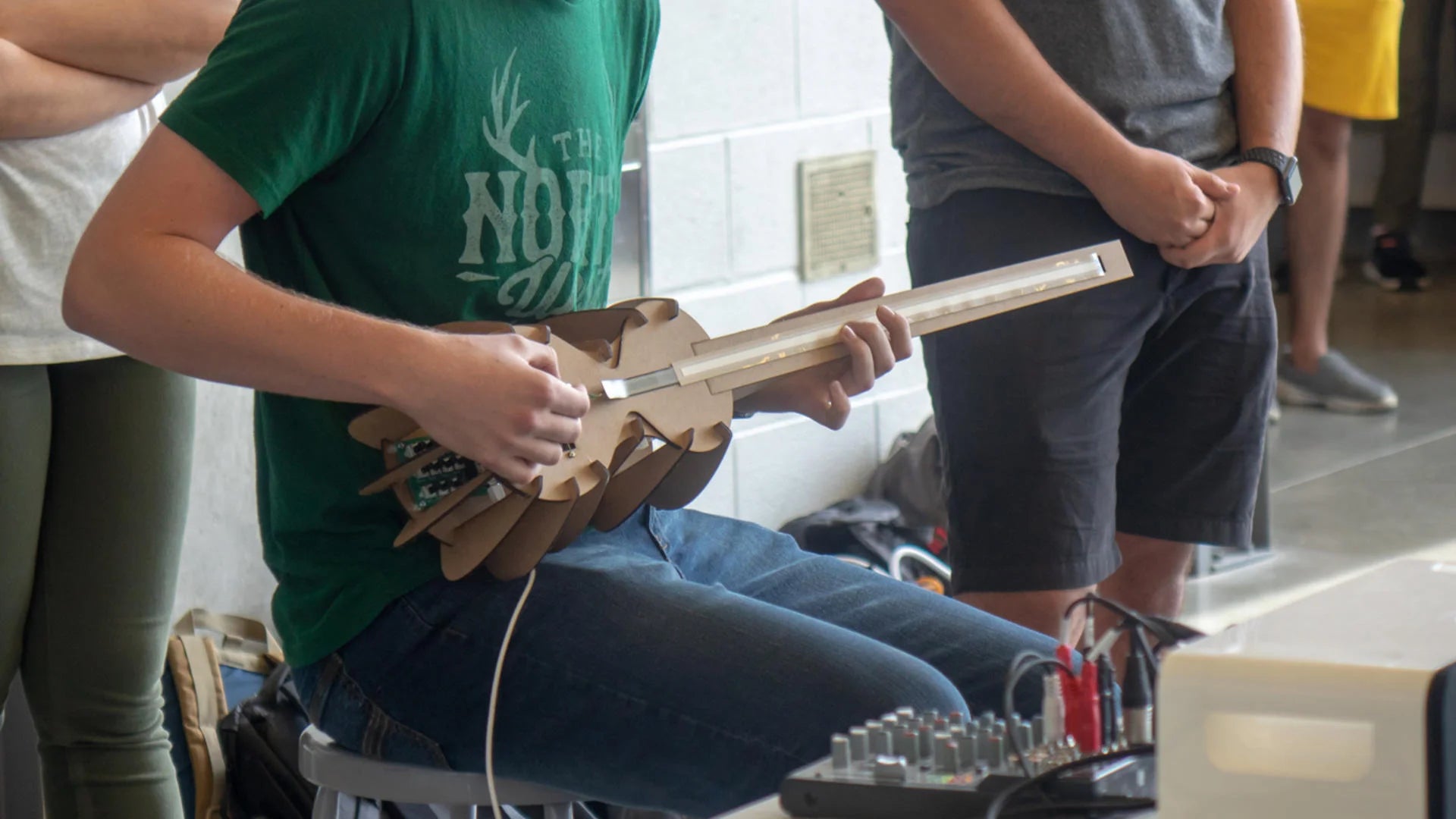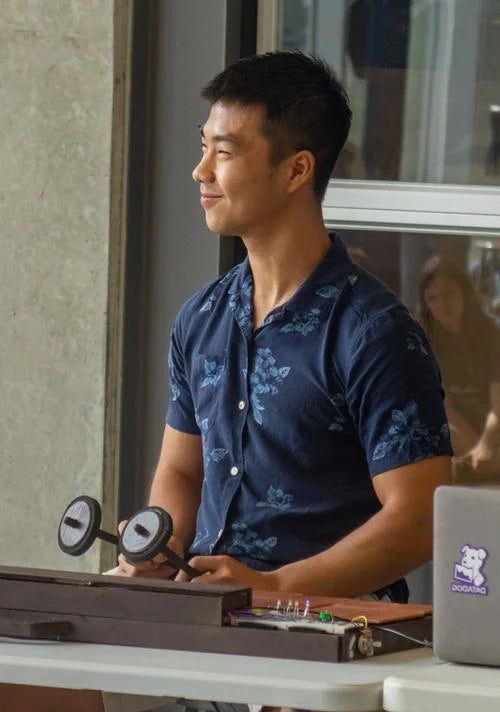Editor:
Brandon Sweet
University Communications
bulletin@uwaterloo.ca
Striking a chord with electronic takes on classic instruments

This article was originally featured on Waterloo Stories.
For many students, a term project can evoke a lot of emotions, such as excitement, worry, and enthusiasm; but for one class it provided an opportunity to reconnect with their own cultures. Last month, more than 80 students taking SYDE 361 staged a memorable concert featuring electronic instruments that they designed and built.
Matt Borland, a lecturer in the Department of Systems Design Engineering at the University of Waterloo, assigned his students to create new electronic musical instruments, and ones not based on western instruments. As a result, several students looked to their own heritages for inspiration.

One group designed a Balinese gamelan, a mallet-based instrument, similar to a xylophone. The students enlisted help of I Dewa Made Suparta, a musician and teacher from Bali specializing in the gamelan at Conrad Grebel University College.
“I’m Indonesian myself, so my group’s decision to make a gamelan was really cool,” said Nicholas Sia, a third-year engineering student.
“It gave me a chance to learn about my own culture while I’m studying in Canada, which isn’t something too many students get to do, especially in this more hands-on sort of way.”
The projects took an entire term to complete, and required technical skill, but also researching, selecting and designing the instrument of choice. Other groups reached out to other musicians in Waterloo region for help with their designs. Alena Delena’s group designed an electronic hurdy-gurdy, a stringed instrument that uses a hand-turned crank. Their source of information was a local musician who came to Waterloo from Europe.
“Our instrument must have gone through a dozen iterations, just from the user-testing feedback alone,” said Andy Park, with a laugh. Park’s group had just finished demoing their improved tap-shoes design. “It’s an important part of systems, right? You have to bake that human element into every design, otherwise it just won’t work.”
Read the full article on Waterloo Stories.
Want to extend your phone's battery life? There's an app for that
This article was originally featured on Waterloo News.
New research out of the University of Waterloo has found a novel method to extend the battery life of smartphones for up to an hour each day.
The researchers have developed an app which smartphone users can use to reduce the energy consumption of their devices without any significant impact on performance.
“The built-in multi-window feature released with the new Android operating system allows users to have multiple windows and files open at the same time similar to a laptop, but this results in unnecessary energy drain,” said Kshirasagar Naik, co-author of the study and a professor in Waterloo’s faculty of Electrical and Computer Engineering.
“We have developed an app which users can install on their devices and use to reduce the brightness of non-critical applications. So, when you’re interacting with one application, the brightness of the other window goes down thereby reduces the energy consumption of the device.”
The app was evaluated in an experiment involving 200 smartphone users, who downloaded the software on their devices and used it while they had multiple windows opened. It was found that when the energy saving technique was used it extended their battery life by 10 to 25 per cent.
“What happens now is that you put the phone on a charger for the night and when you leave home the next day the battery is at 100 per cent, but there is a lot of behind the scenes computation and communication going on, and it drains the battery,” said Naik. “By midday charge is reduced to 30 per cent. So, you need to charge the battery many times in a day, and from the user’s perspective that is a big pain.
“Due to the excess energy consumption, the phone becomes warmer and warmer while the frequent charging reduces the life of the battery. So, batteries that are meant to last for three years may have to be replaced in two years.”
The study, MultiDroid: An Energy Optimization Technique for Multi-Window Operations on OLED Smartphones, co-authored by Milind Kumar Rohit, Chiranjeev Kumar and Ginny all of the Indian Institute of Technology and Naik was recently published in IEEE Access, an open access journal of the Institute of Electrical and Electronics Engineers.
Link of the day
2018 US Open Tennis Tournament
When and where
QPR Training, Monday, August 27, 10:30 a.m., Needles Hall 2nd Floor.
Research ethics system training, Tuesday, August 28, 9:00 a.m. to 10:30 a.m., EC5 3167 (please bring a laptop). For all upcoming sessions, please visit the Research ethics system webpage.
WatCACE seminar featuring Professor Kate Lloyd, Associate Professor and Director for Learning, Teaching and Research in PACE at Macquarie University, Australia, “A Holistic Approach to Evaluating Macquarie University's Institution-Wide Work-Integrated Learning Program - Professional and Community Engagement (PACE)”, Tuesday, August 28, 10:00 a.m. to 22:30 a.m., EC5 1111.
Research ethics system training, Wednesday, August 29, 9:00 a.m. to 10:30 a.m., EC5 3167 (please bring a laptop). For all upcoming sessions, please visit the Research ethics system webpage.
Waterloo Women's Wednesdays: Knit & Nourish, Wednesday, August 29, 12:00 p.m., DC 1301.
Single & Sexy Premiere Performance, Friday, August 31, 10:45 a.m., Physical Activities Complex.
International Orientation, Friday, August 31 to Sunday, September 2.
International Orientation - Parent and Family sessions, Saturday, September 1, 9:30 a.m. to 4:00 p.m.
Orientation 2018, Sunday, September 2 to Saturday, September 8.
Parent and Family Orientation, Sunday, September 2 and Monday, September 3.
Labour Day, Monday, September 3, most University operations closed.
Co-operative work term begins, Tuesday, September 4.
Graduate student orientation, Tuesday, September 4.
Research ethics system training, Tuesday, September 4, 9:00 a.m. to 10:30 a.m., MC 1078. For all upcoming sessions, please visit the Research ethics system webpage.
Lectures begin, Thursday, September 6.
Music Department Ensemble Auditions for Fall 2018, Thursday, September 6 to Friday, September 21, Conrad Grebel University College.
Feds Welcome Week, Monday, September 10 to Friday, September 14.
NEW - LGBTQ+ Making Spaces workshop, Monday, September 10, 2018, 9:00 a.m. to 12:30 p.m., STC 2002.
Coping Skills Seminar - Challenging Thinking, Monday, September 10, 4:00 p.m., HS 2302.
NEW - Research ethics system training, Wednesday, September 12, 9:00 a.m. to 10:30 a.m., MC 1078. For all upcoming sessions, please visit the Research ethics system webpage.